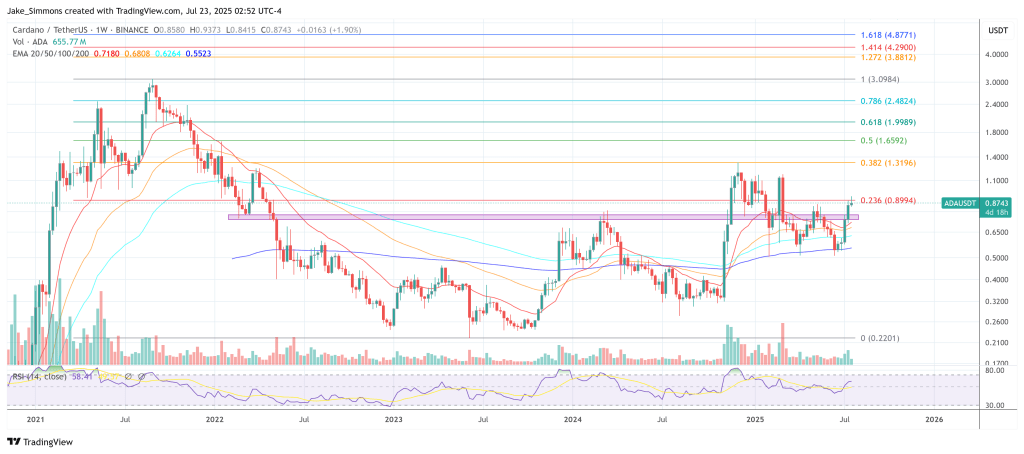In a most unexpected twist, the eternal debate about Bitcoin‘s limits has been reignited, as Input Output, the company behind Cardano, unveils a pipeline that executes Cardano’s smart contracts on Bitcoin without altering a single line of Bitcoin’s code! 🤯💥 “A novel compilation pipeline being developed at Input | Output takes a Cardano smart contract, written using a modern language like Python, TypeScript, or Scala, and runs it on Bitcoin without modifying Bitcoin itself,” the company wrote on X late Tuesday night, attaching a six-post technical thread that spelled out the process in detail. 📜🤖
Bitcoin Gets Cardano Smart Contracts
The thread describes a relay of representations that begins with high-level source code and ends inside Bitcoin Script. First, Cardano’s tool-chain lowers the contract into Untyped Plutus Core (UPLC), a stripped-down functional bytecode. UPLC is then serialized and handed to a miniature interpreter known as the Control–Environment–Continuation (CEK) machine. Instead of asking Bitcoin to interpret UPLC directly, IO compiles the CEK machine itself into RISC-V, “a real-world, simple CPU instruction set.” The resulting RISC-V program becomes the payload that Bitcoin ultimately verifies, with the serialized UPLC passed to it at run-time. 🧠⚡
A companion blog post signed by software engineer Riley Kilgore frames the design in a single sentence: “By combining a serialized smart contract format (Untyped Plutus Core – UPLC), a clever interpreter architecture (CEK machine), and a widely supported open-source reduced instruction set architecture (RISC-V), IO is turning that idea into reality.” Because the RISC-V code is deterministic and its execution trace can be proven—or disputed—inside Bitcoin Script, no soft-fork is required. Bitcoin remains unchanged; the expressiveness is off-loaded to an auxiliary virtual CPU whose behaviour can be challenged step by step. 🎭⚖️
The security anchor for those challenges is BitVMX, a descendant of Robin Linus’s 2023 BitVM proposal for “disputable computation” on Bitcoin. IO’s newsroom statement calls BitVMX an “innovative, trust-minimized protocol” that “operates on a 1-out-of-n honest-operator model” and lets developers “pay transaction fees in BTC directly from their preferred wallet.” BitVMX inherits the optimistic-roll-up style of BitVM—off-chain execution, on-chain fraud proofs—but replaces BitVM’s bespoke circuits with a full RISC-V core, allowing unmodified binaries compiled by standard tool-chains. 🔐🚀
The promise is to bring Cardano’s eUTxO-based smart-contract ecosystem—Marlowe, Aiken, and the rest—into Bitcoin’s vast liquidity pool. In practical terms that could mean lending, swaps, and even NFT-backed loans secured by BTC collateral, all without giving custodial control to a sidechain. 🏦🔐
For Bitcoin purists the move is both familiar and contentious. Taproot in 2021 expanded Script with Schnorr signatures and key-path spends, giving the network its first taste of complex smart-contract logic, while BitVM in 2023 showed that arbitrary computation could be verified rather than executed by Bitcoin nodes. IO’s pipeline pushes those ideas further, but it does so in a way that keeps the base layer unaltered—a design criterion that BitVM’s authors called non-negotiable for Bitcoin’s social contract. 🧩⚖️
The compilation flow is still in active development; IO has not committed to a main-net launch date, nor has it published gas-cost benchmarks for typical contracts. What it has done is demonstrate a theoretically complete bridge between two philosophically divergent blockchains. If the engineering hurdles—transaction sizes, dispute latency, and user-experience frictions—can be contained, Cardano’s software stack may soon become a first-class citizen on Bitcoin. 🚀🌍
At press time, ADA traded at $0.87. 💸

Read More
- EUR USD PREDICTION
- DOGE GBP PREDICTION. DOGE cryptocurrency
- NEXO PREDICTION. NEXO cryptocurrency
- Is XRP About to Soar or Crash? The $3.27 Dilemma Explained!
- CRV PREDICTION. CRV cryptocurrency
- STX PREDICTION. STX cryptocurrency
- USD KZT PREDICTION
- GBP USD PREDICTION
- TAO PREDICTION. TAO cryptocurrency
- USD TRY PREDICTION
2025-07-23 19:18